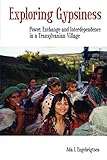Exploring Gypsiness : Power, Exchange and Interdependence in a Transylvanian Village / Ada I. Engebrigtsen.
Material type: TextPublisher: New York ; Oxford : Berghahn Books, [2007]Copyright date: ©2007Description: 1 online resource (232 p.)Content type:
TextPublisher: New York ; Oxford : Berghahn Books, [2007]Copyright date: ©2007Description: 1 online resource (232 p.)Content type: - 9781845455026
- 9780857457103
- 305.891/49704984
- DX224 .E64 2009
- online - DeGruyter
| Item type | Current library | Call number | URL | Status | Notes | Barcode | |
|---|---|---|---|---|---|---|---|
 eBook
eBook
|
Biblioteca "Angelicum" Pont. Univ. S.Tommaso d'Aquino Nuvola online | online - DeGruyter (Browse shelf(Opens below)) | Online access | Not for loan (Accesso limitato) | Accesso per gli utenti autorizzati / Access for authorized users | (dgr)9780857457103 |
Frontmatter -- Contents -- Preface -- Acknowledgements -- Transcriptions, Pronunciations and Vocabulary -- Introduction -- PART I THE ROM WORLD -- 1 Roma in the Romanian Figuration -- 2 Cultivating and Harvesting Social Environment -- 3 Gender, Shame and Honour -- 4 Amari Familia: Belonging Together -- 5 Competing for Equality -- 6 Rom Leadership: Joska Bulibaša -- 7 Romanimo: Towards a Rom Cosmology -- PART II ROMA AS VILLAGERS -- Introduction -- 8 Village Life, Peasant Cosmology -- 9 Exchange and Power -- 10 The Ţigan as Signifier -- Epilogue -- Bibliography -- Index
restricted access online access with authorization star
http://purl.org/coar/access_right/c_16ec
Romania has a larger Gypsy population than most other countries but little is known about the relationship between this group and the non-Gypsy Romanians around them. This book focuses on a group of Rom Gypsies living in a village in Transylvania and explores their social life and cosmology. Because Rom Gypsies are dependent on and define themselves in relation to the surrounding non-Gypsy populations, it is important to understand their day-to-day interactions with these neighbors, primarily peasants to whom they relate through extended barter. The author comes to the conclusion that, although economically and politically marginal, Rom Gypsies are central to Romanian collective identity in that they offer desirable and repulsive counter images, incorporating the uncivilized, immoral and destructive "other". This interdependence creates tensions but it also allows for some degree of cultural and political autonomy for the Roma within Romanian society.
Mode of access: Internet via World Wide Web.
In English.
Description based on online resource; title from PDF title page (publisher's Web site, viewed 25. Jun 2024)


